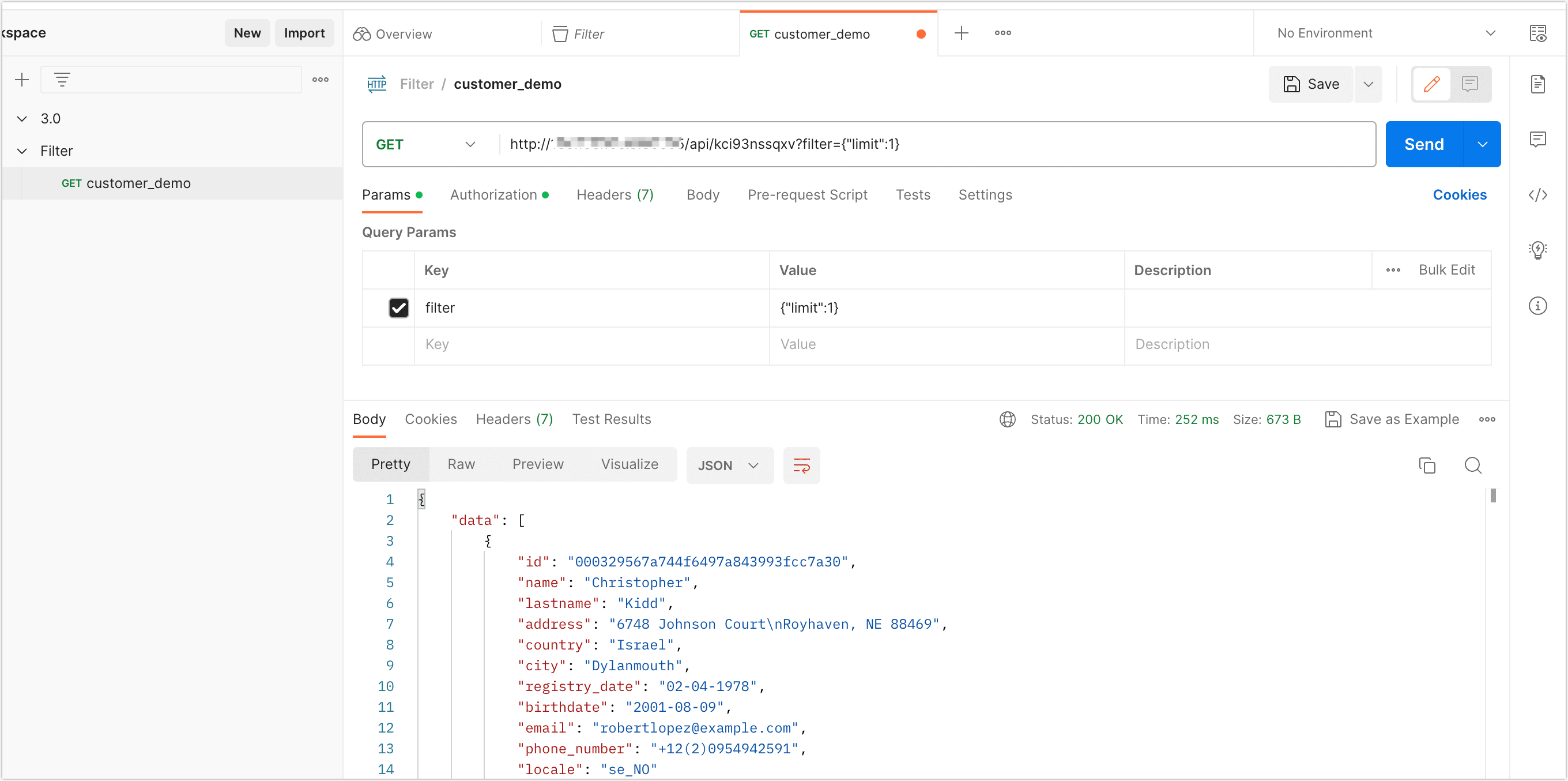API Query Parameters

 TapData Enterprise can be deployed in your local data center, making it suitable for scenarios with strict requirements on data sensitivity or network isolation. It can serve to build real-time data warehouses, enable real-time data exchange, data migration, and more.
TapData Enterprise can be deployed in your local data center, making it suitable for scenarios with strict requirements on data sensitivity or network isolation. It can serve to build real-time data warehouses, enable real-time data exchange, data migration, and more.When invoking published API interfaces, it's possible to add query conditions in the URL query string to quickly filter the query results. This article introduces supported filters and provides related usage examples.
Supported Filters
- Limit Filter (Return Record Count Filter): Limits the number of returned records.
- Skip Filter (Skip Specified Record Count Filter): Skips a specified number of rows in the returned data.
- Where Filter (Query Condition Filter): Queries and returns data based on a set of logically related conditions, similar to SQL's WHERE clause.
In this case, we have published the customer table as an API service, and the data comes from a randomly generated source. Its table structure and data sample are as follows:
mysql> SELECT * FROM customer LIMIT 1\G;
*************************** 1. row ***************************
id: 000329567a744f6497a843993fcc7a30
name: Christopher
lastname: Kidd
address: 6748 Johnson Court
Royhaven, NE 88469
country: Israel
city: Dylanmouth
registry_date: 02-04-1978
birthdate: 2001-08-09
email: robertlopez@example.com
phone_number: +12(2)0954942591
locale: se_NO
1 row in set (0.00 sec)
You can also use the Postman tool for a visualized invocation as shown in the following figure:

Next, we will introduce how to use various filters and provide examples, i.e., setting Query Params in the figure above, which corresponds to parameters after the question mark in the request URL.
Limit Filter
Limit the total number of returned records to be equal to or less than a specified number. The default is 10. It is often used with the Skip Filter to implement pagination queries. The syntax is as follows:
# Method one
filter[limit]=n
# Method two
filter={"limit":n}
Usage Example
Assuming we want to return only 1 query result from the customer table:
# Method one
?filter[limit]=1
# Method two
?filter={"limit":1}
Return Example
{
"data": [
{
"id": "000329567a744f6497a843993fcc7a30",
"name": "Christopher",
"lastname": "Kidd",
"address": "6748 Johnson Court\nRoyhaven, NE 88469",
"country": "Israel",
"city": "Dylanmouth",
"registry_date": "02-04-1978",
"birthdate": "2001-08-09",
"email": "robertlopez@example.com",
"phone_number": "+12(2)0954942591",
"locale": "se_NO"
}
],
"total": {
"count": 49998
},
"api_monit_info": {
"recv_timestmap": 1688868479316,
"db_request_exhaust": 147,
"resp_timestmap": 1688868479463
}
}
Skip Filter
Returns the query result after skipping a specified number of records starting from the 1st record. It is often used with the Limit Filter to implement pagination queries. The syntax is as follows:
# Method one
filter[skip]=n
# Method two
filter={"skip":n}
Usage Example
Example one: Return results starting from the 10th record:
# Method one
?filter[skip]=10
# Method two
?filter{"skip":10}
Example two: Display 10 records per page and query data on the 5th page:
# Method one
?filter[limit]=10&filter[skip]=50
# Method two
?filter={"limit":10,"skip":50}
Return Example
The following example shows the return result for example two.
{
"data": [
{
"id": "004c44345baf4b60b8dacc253f7a2ca3",
"name": "Kristen",
"lastname": "Potts",
"address": "77579 Rodriguez Mountain\nCamachoburgh, MI 90174",
"country": "Botswana",
"city": "West Erin",
"registry_date": "20-11-2005",
"birthdate": "2017-01-29",
"email": "csmith@example.net",
"phone_number
": "928-622-3569x475",
"locale": "cy_GB"
},
...
],
"total": {
"count": 49988
},
"api_monit_info": {
"recv_timestmap": 1688868479316,
"db_request_exhaust": 147,
"resp_timestmap": 1688868479463
}
}
Where Filter
Query and return data according to a set of logically related conditions. It's similar to SQL's WHERE clause. The syntax is as follows:
# Method one
filter[where][field][operator]=value
# Method two
filter={"where":{"field":{"operator":value}}}
Usage Example
Example: Query customers whose names are "Christopher":
# Method one
?filter[where][name][eq]=Christopher
# Method two
?filter={"where":{"name":{"eq":"Christopher"}}}
Return Example
The return result is a JSON array containing all records that meet the query condition, i.e., customer names are "Christopher".
{
"data": [
{
"id": "000329567a744f6497a843993fcc7a30",
"name": "Christopher",
"lastname": "Kidd",
"address": "6748 Johnson Court\nRoyhaven, NE 88469",
"country": "Israel",
"city": "Dylanmouth",
"registry_date": "02-04-1978",
"birthdate": "2001-08-09",
"email": "robertlopez@example.com",
"phone_number": "+12(2)0954942591",
"locale": "se_NO"
}
],
"total": {
"count": 1
},
"api_monit_info": {
"recv_timestmap": 1688868479316,
"db_request_exhaust": 147,
"resp_timestmap": 1688868479463
}
}
More Examples and Complex Filters
Example 1: Combined Use of Limit and Where Filters
Return 5 records where the name is "Christopher".
# Method one
?filter[where][name][eq]=Christopher&filter[limit]=5
# Method two
?filter={"where":{"name":{"eq":"Christopher"}},"limit":5}
Example 2: Multiple Conditions in Where Filter
Return records where the name is "Christopher" and the country is "Israel".
# Method one
?filter[where][name][eq]=Christopher&filter[where][country][eq]=Israel
# Method two
?filter={"where":{"name":{"eq":"Christopher"},"country":{"eq":"Israel"}}}
Example 3: Using Logical Operators (AND, OR)
Return records where the name is "Christopher" OR "Alex".
# Method one (not recommended due to ambiguity)
?filter[where][name][eq]=Christopher&filter[where][name][eq]=Alex
# Method two
?filter={"where":{"or":[{"name":{"eq":"Christopher"}},{"name":{"eq":"Alex"}}]}}